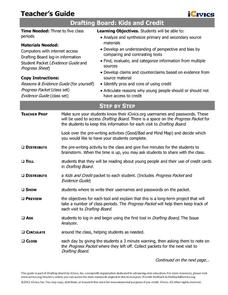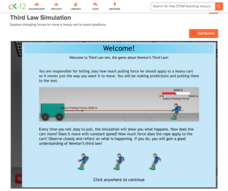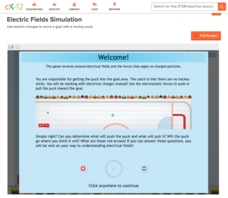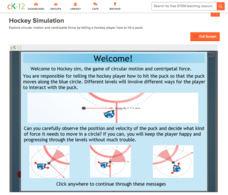Houghton Mifflin Harcourt
Core Analysis Frame: Fiction
Dig into any piece of fiction with a series of analysis questions. There are two levels of questions provided: basic and in-depth. The basic questions can be copied double-sided onto a single piece of paper, while the in-depth questions...
iCivics
Drafting Board: Interest Groups
Does the influence of interest groups harm a political system? Your class members will analyze the role of interest groups in American politics, as well as consider the effect of perspective, bias, loyalty, and the First Amendment.
iCivics
Drafting Board: Kids and Credit
Should kids under the age of 18 be given access to credit cards? Learners identify pros and cons of using credit, develop claims based on evidence, and finally argue reasons for or against credit for minors.
iCivics
Drafting Board: Military Intervention
Should countries use their militaries to stop humanitarian crises in other countries? Learners make claims, organize their reasoning, and provide evidence for their arguments with this rich resource.
iCivics
Drafting Board: Electoral College
Should the president of the United States be voted by the Electoral College or the popular vote? Your young historians will consider the pros and cons of the Electoral College, and make an argument using reasons and evidence provided in...
iCivics
Drafting Board: Community Service
Should schools impose community service graduation requirements? In the final lesson of the Drafting Board series, learners solidify their practice of crafting an argument supported by sound reason and evidence.
Museum of Tolerance
Essential Vocabulary and Concepts
Genocide. Scapegoat. Propaganda. Words are powerful. Words carry the weight of history. To prepare for a visit to The Museum of Tolerance, class members consider the weight of meaning in words related to intolerance.
Chicago Botanic Garden
Food for Thought: Climate Change and Trophic Cascades
Learners examines the arctic food web with a short video about polar bears and an article about bears and warming temperatures. They design an arctic food web and discuss the trophic cascade that could come from climate change.
Science Matters
Landforms from Volcanoes
Three major types of volcanoes exist: cinder cone, composite/strata, and shield. The 18th lesson plan in a 20-part series covers the various landforms created from volcanoes. Scholars work in pairs to correctly identify the three types...
Roy Rosenzweig Center for History and New Media
Labor Unions in an Industrializing U.S.
Have class members eager to enter the workforce? They'll be glad to learn that things aren't how they used to be. Have your young historians examine then discuss four primary source images related to the negative effects of...
CK-12 Foundation
Dungeon Simulation
Tommy is stuck in a dungeon and can only escape if you can discover the correct formula for velocity! Through trial and error, scholars enter the velocity required for Tommy to reach the elevator at the proper time. Then they extrapolate...
CK-12 Foundation
Car Collision
When a car crashes into a wall, does it just stop or does it bounce or roll backwards? A simulation relates velocity, kinetic energy, momentum, and restitution to answer this question. Scholars apply their knowledge through eight levels...
CK-12 Foundation
Free Body Simulation
To show the magnitude and direction of all forces acting upon an object, scientists use a free body diagram. This simulation serves as an introduction to free body diagrams allowing scholars to build their own. Pupils select the proper...
CK-12 Foundation
Third Law Simulation
Keep calm and use the force! Joey pulls a cart and scholars adjust the force required to control the movement. Through simulating different scenarios, participants learn about Newton's Third Law. It includes analysis questions throughout...
CK-12 Foundation
Energy Conservation Simulation
Does the amount of a roller coaster's energy change as it goes along the track? Scholars investigate when a roller coaster has potential and kinetic energy. They observe the changes as it goes up the initial hill follows it throughout...
CK-12 Foundation
Electric Ice Sheet
Tommy is trapped on an ice bridge and needs you to balance the charges so he doesn't fall into the icy water! Scholars apply Coulomb's Law, which relates to both the strength and the distance between charges. They work with these two...
CK-12 Foundation
Electric Fields Simulation
Can you get the puck into the goal using only electric charges on the ice? Scholars experiment with electrostatic forces as they determine which charges pull the puck and which repel it. Multiple levels reinforce different related...
CK-12 Foundation
Cannon Simulation
Fire in the hole! Thrill your classes as they see what it's like to fire a cannon ball. Scholars practice aiming a cannon ball by altering first the firing angle, then the velocity, and finally both simultaneously. Can they discover the...
CK-12 Foundation
Hockey Simulation
Do you understand the science behind hitting a hockey puck to control the direction it moves? Pupils experiment by telling a hockey player how to hit the puck so it moves in a circular direction. Through manipulating the velocity and...
CK-12 Foundation
Oscillations Simulation
What makes a swing go back and forth like a pendulum rather than going all the way around? Scholars use the simulation to explore pendulums and how they work. They vary the weight, length of the rope, and even gravity in various trials.
CK-12 Foundation
Power and Efficiency Simulation
How much energy in Jewels does it take to tow a car up a slope? Scholars explore different values of both kinetic and potential energy to answer that question. Through multiple levels, the difficulty increases — as does your young...
CK-12 Foundation
Capacitor Simulation
The camera flash works based on a simple circuit, but why does it require a capacitor? Scholars work through two levels of simulations related to circuits and capacitors. The pupils first use a simple circuit with a battery, resistor,...
CK-12 Foundation
Resistor Simulation
Many scholars struggle to picture electrons traveling in a circuit but understand water going through a pipe. The simulation compares circuits to water pipes. It walks pupils through four levels of questions, allowing them to switch...
The New York Times
Investigating the Heroin and Prescription Opioid Epidemic
How bad is the opioid crisis in America? Has it gotten worse in the last few decades? Why? High schoolers delve into these questions with a thorough and thoughtful lesson from The New York Times on heroin prescription opioids. Starting...

























